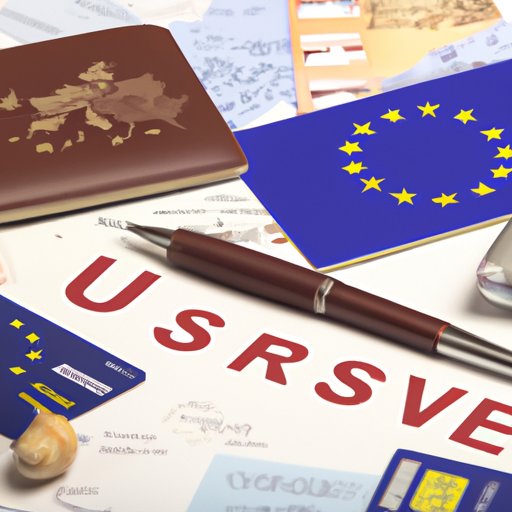Introduction
Europe is a continent of fascinating countries and cultures. From the rolling hills of Ireland to the canals of Amsterdam, there are endless places to explore. Whether you’re traveling solo or with a group, visiting Europe is an exciting adventure. But before you start packing your bags, there are some important things to consider. In this article, we’ll discuss what you need to know for a successful trip to Europe, including visa requirements, packing tips, budgeting, transportation, accommodation, itineraries, cultural norms, and travel insurance.
Researching Visa Requirements
Depending on your nationality, you may need to obtain a visa before traveling to Europe. The European Union (EU) has specific regulations and restrictions regarding visas, so it’s important to research the requirements for your country. Generally speaking, citizens of the US, Canada, Australia, and New Zealand don’t need a visa for stays of up to 90 days in Europe. However, if you plan to stay longer than 90 days, you will need to apply for a visa.
When applying for a visa, you’ll need to provide certain documents, including a valid passport, proof of financial stability, and a completed application form. It’s also a good idea to book your flights and accommodations in advance, as you may be asked to provide evidence of these during the visa application process. Additionally, you should give yourself plenty of time to apply for a visa; the processing times can vary greatly depending on the country.
If you’re unsure about the visa requirements for your destination, there are a number of online resources that can help. The EU website provides detailed information about visa requirements for each member state, and there are also several third-party websites that offer helpful advice and guidance.
Packing the Essential Items
Once you’ve taken care of the visa requirements, it’s time to start packing. Clothes and footwear are the most obvious items, but there are a few other essentials you should bring along. Toiletries and medications are always important, as well as any electronic devices you might need, such as a laptop or smartphone. Make sure to pack all the necessary chargers and adapters, too.
It’s also a good idea to bring a small first aid kit and some basic tools. A universal power strip is also useful, as it can be used to charge multiple devices at once. Finally, don’t forget to bring a few snacks and a refillable water bottle, as these can come in handy when traveling between destinations.
Choosing a Budget-Friendly Destination
Traveling to Europe doesn’t have to be expensive. There are many budget-friendly destinations that offer great value for money. When selecting a destination, consider the currency exchange rate; some countries have stronger currencies than others, which can affect how far your money goes. Additionally, research transportation costs, as some cities or regions may be more expensive to get to than others.
Finally, analyze the cost of living in each destination. Prices for food, accommodation, and attractions can vary greatly from one place to another, so make sure to factor this into your decision. With a bit of research, you should be able to find a destination that fits your budget.
Booking Transportation and Accommodation
Once you’ve chosen a destination, it’s time to book your transportation and accommodation. There are a number of online booking services that can help with this, such as Expedia, Booking.com, and Airbnb. Be sure to look for discounts or deals, as these can save you money. It’s also a good idea to read reviews and ratings before booking, as this can give you an idea of what to expect.
Planning an Itinerary
Creating an itinerary is an important part of planning a trip. Before you start making a list of attractions and activities, establish some general goals for the trip. Do you want to visit as many countries as possible, or focus on a single destination? Are you looking for a relaxing vacation, or an action-packed adventure? Once you have a clear idea of what you want to achieve, you can begin to plan your itinerary.
Identify the must-see attractions and activities, and determine how much time you can spend at each location. Don’t try to cram too much into each day; leave room for spontaneous adventures and unexpected surprises. Lastly, create a rough timeline of when you plan to visit each destination, and use this as a guide when booking transportation and accommodation.
Understanding Cultural Norms
Every country has its own customs and etiquette, so it’s important to do some research on the culture of your destination before you arrive. Learn about local customs and traditions, and be respectful of cultural differences. Additionally, familiarize yourself with the laws and regulations of the country, as these can vary from place to place.
Obtaining Travel Insurance
Travel insurance is a must for any international trip. There are a variety of insurance plans available, ranging from basic coverage to more comprehensive plans. The type of plan you choose will depend on your individual needs and preferences. Generally speaking, travel insurance covers medical expenses, flight cancellations, lost luggage, and other unexpected events.
Before selecting a plan, compare different policies and read the fine print. Look for plans that cover the activities you plan to do while traveling, such as hiking or skiing. Additionally, make sure to check the exclusions, as some plans may not cover certain risks or activities.
Conclusion
Travelling to Europe can be a rewarding experience, but it’s important to do your research beforehand. This article has discussed what you need to know for a successful trip, including visa requirements, packing tips, budgeting, transportation, accommodation, itineraries, cultural norms, and travel insurance. With a bit of planning and preparation, you can ensure that your trip is both safe and enjoyable.
(Note: Is this article not meeting your expectations? Do you have knowledge or insights to share? Unlock new opportunities and expand your reach by joining our authors team. Click Registration to join us and share your expertise with our readers.)
